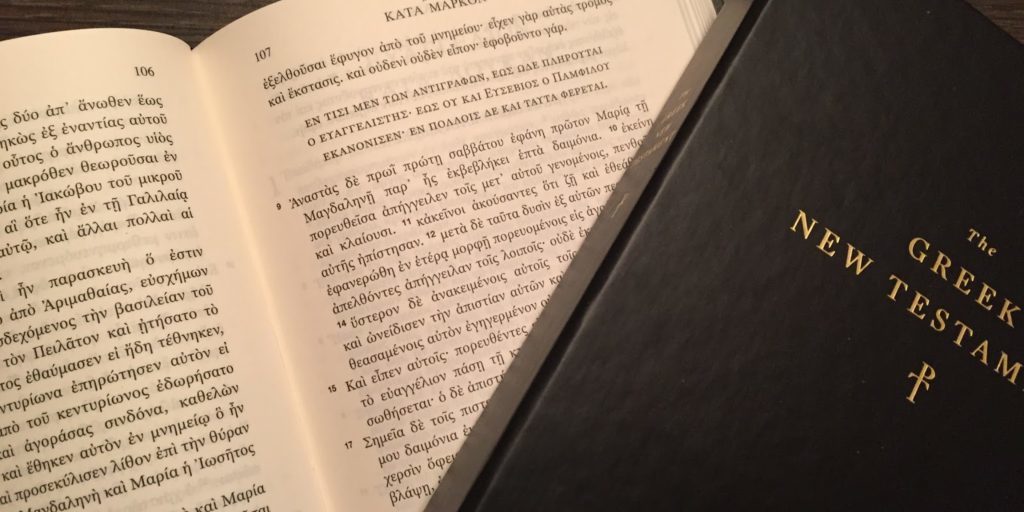
Why Pastors Should Engage the Greek New Testament
If pastors think back to their time at seminary or Bible college, they probably remember many of their classmates, one or two of the most inspiring instructors, some hilarious situations, the odd embarrassment, and, perhaps, the hours apparently wasted on learning Greek. Getting the alphabet was OK, as it provided us with some boasting rights, but why all the inflections and declension, the complicated verb forms? Why spend so much time on learning a new skill?
Should We Engage the Greek New Testament?
Some have enjoyed Greek, though. It is a measurable skill, you get the questions on the quiz either correct or wrong, and when there is a translation exercise from the New Testament, you know the correct answer already, as all the translation work has been done many times before. Others may have enjoyed Greek only in hindsight, relishing the idea that they passed the Greek exams.
But what has been the benefit for your ministry? After all, many of us have gotten by without any level of fluency. We see successful ministers who have hardly any ability in the biblical languages, and we ask ourselves, What was the point of all our efforts? If we can preach the Gospel, if we can comfort those who need it, if we can make sense of the commentaries, why put any effort in keeping up with Greek, and why bother with the languages in the first place?
If these points are not enough, there is the ultimate argument against learning Greek: we have translations. Not just one, but a range of translations. And many modern English versions are well done; they are good within the translation philosophy they set out. We have very good translations. And these translations do their job. More people have come to faith by reading the English then the Greek. More sermons have been prepared largely from the English than from the Greek (including by those of us who still have an open Greek New Testament on our desk). If translations are so good and so effective, why would pastors still engage with the Greek text?
To put the Greek problem in different terms, pastors have a ‘job’ to do. Studies, talks, and sermons need to be prepared, and we have been taught to use the right ‘tools’ to complete the task. And for us, the Greek New Testament is one of these tools. By experience we have learned that is not the most efficient tool: it is difficult to use and it is time consuming. There are other helps available that bring us quicker to the completion of this week’s preparations. Why should pastors engage with Greek? You might have reached the stage where your answer to the question is, ‘Perhaps we should not try to engage at all.’
Scripture and the Soul
Somewhere along the way I have lost the argument already, it seems. And that is because we have allowed some of the language and some of the categories to go unchallenged. So please bear with me and allow me to give you some food for thought. What trap have we fallen into by allowed ourselves to think about the Greek New Testament as a ‘tool’ for ministry? The Bible is not, and can never be, just a tool for ministry – it is God speaking. Click To Tweet
‘Man shall not live by bread alone but by every word that comes out of the mouth of God.’ These words from the Old Testament are quoted by Jesus when tempted by the devil. The Bible is not, and can never be, just a tool for ministry – it is God speaking. God’s Word is food for the soul, it is life. And as pastors we have the privilege of feeding our churches with this Word. Is our prayer ‘Father, please give me the most efficient tools for this week’s sermon prep.’ Or is it, ‘Draw me into your Word and into your thoughts so that I can share the food you are feeding me?’
Thinking about Greek as a tool avoids what we are talking about. We are not dealing with ‘Greek,’ but with the New Testament in Greek. And that is what was given by the Holy Spirit. And yes, it is translatable, and the translations are effective, but still the Greek wording represents the purest form of the teaching of Jesus for the church (please forgive me for ignoring the Hebrew Old Testament at this point). Why do pastors need Greek? Because they need to expose themselves directly to God’s Word.
I am going to make a – perhaps surprising – admission. If Greek is mainly a tool for sermon preparation, it is quite an ineffective one. Yes, I laud all who bring out the details of the text. If your Greek is good enough to use on a weekly basis, your goal of staying close to the nuance and train of thought of Scripture becomes much easier. But as a tool for those of us who need (considerable) time to wrestle ourselves through a passage, engaging the Greek New Testament is an inefficient process. The Greek would help to cut out many of the wrong interpretations we might base on the English translation, and it would help to show us how the text hangs together and forms a coherent whole. But the benefits for sermon prep can hardly justify the hours spent on it, especially if we have the aid of a good commentary. If you are in this position, I am not going to encourage you to devote a large part of your preparation time to reading the passage of the week in Greek. But I still think you should engage with the New Testament.
Pastors need to stay fresh in spirit  and drink deeply from the well of Scripture. Not for the sake of our next talk, but for the sake of our own souls. As the people in the churches, also their leaders need to be transformed by the speaking of God. The reading of a few verses per day in the original language, or perhaps a page per week, gives us a sense of authenticity in living with Scripture that few other devotional exercises can achieve. It is a most precious and undervalued spiritual discipline. We teach ourselves to slow down in our reading, to pause over every phrase, and to imprint the patterns of speech on our mind. Sometimes the benefit is little more than the satisfaction that we have achieved our page of Greek for the week, more often it is the secure knowledge that we have allowed nothing to stand between us and the word of the Master. At the same time, reading a small part of the Greek New Testament humbles us in showing the limitations of our knowledge and understanding.
and drink deeply from the well of Scripture. Not for the sake of our next talk, but for the sake of our own souls. As the people in the churches, also their leaders need to be transformed by the speaking of God. The reading of a few verses per day in the original language, or perhaps a page per week, gives us a sense of authenticity in living with Scripture that few other devotional exercises can achieve. It is a most precious and undervalued spiritual discipline. We teach ourselves to slow down in our reading, to pause over every phrase, and to imprint the patterns of speech on our mind. Sometimes the benefit is little more than the satisfaction that we have achieved our page of Greek for the week, more often it is the secure knowledge that we have allowed nothing to stand between us and the word of the Master. At the same time, reading a small part of the Greek New Testament humbles us in showing the limitations of our knowledge and understanding.
Of course, our reading will not impact preaching directly, and please do not expose the church to our not-yet-matured Greek insights. But the transformation effected by our humble wrestling with the words will deepen our understanding of the Word and of Him who spoke it. Not only does our engagement with the Greek New Testament gives us the confidence and security that we have unmediated, direct access to God’s Word, it also forms part of the renewal of our mind by the words which the Holy Spirit chose to reveal God’s mind.

